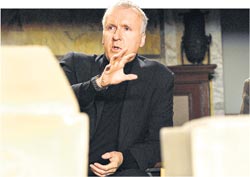
Christ-bashingChristians angered by Easter-time promotions for 'wacky' works about Jesus NEW YORK (AP) - The Easter season has an odd, new tradition: The period of reflection on the Crucifixion and Resurrection has become a popular time for marketers to roll out works - from the scholarly to the sensational - that challenge Christianity's core beliefs. In the last several years, churchgoers have been hit with a steady stream of claims that Jesus didn't die on the cross, that he had a wife and kids, and that the Bible is a fraud.
Christians across a broad spectrum of belief are angered by the trend. They accept the freedom to question religion, but wonder why the assaults come during their faith's most sacred days. "Why are they doing it now and why are they doing it in such a provocative way?" asked the Rev. James Martin, a Jesuit writer and author of "My Life With the Saints." "We have nothing to fear from serious scientific inquiry, but when it's slanted and leaves out the religious point of view, it's very misleading," Martin said. "It can all be tied together in a slick package that can be very compelling." This year's outrage for Christians was "The Lost Tomb of Jesus," a documentary suggesting that a south Jerusalem cave discovered in 1980 contained the remains of Jesus - indicating he wasn't resurrected. The filmmakers also suggest that Mary Magdalene was buried in the tomb, that she and Jesus were married, and that a stone box labeled "Judah son of Jesus" belonged to their son. The documentary was unveiled in early March, six days into Lent, by James Cameron, Oscar-winning director of "Titanic," who produced the film. It drew attention around the world. Top archeologists in the U.S. and abroad called that claim and the film's findings preposterous, but a book based on the documentary quickly climbed best-seller lists. "There is more tolerance in the general culture for all things wild and wacky about Jesus," said Ben Witherington, a New Testament expert at Asbury Theological Seminary and author of "What Have They Done With Jesus?" Last year's Lenten season brought similar affronts. The paperback edition of Dan Brown's worldwide best-selling novel "The Da Vinci Code" - about a Roman Catholic conspiracy to hide Jesus' marriage - was released, along with Michael Baigent's nonfiction, "The Jesus Papers: Exposing the Greatest Cover-Up in History." Baigent said that Jesus was married and had a child and was not thought to be divine until long after his era. The author conceded that "we are short of evidence" backing his claims. Still, his book publicity asked: "What if everything we have been told about the origins of Christianity is a lie?" Other Easters have seen the release of works on the Gnostic gospels - the religious rival that lost out to orthodox Christianity in ancient times - and TV specials asserting that Jesus was merely human. "It's become a rite of passage in the Lenten season," said Bill Donohue, head of the Catholic League, an anti-defamation group. "It's not a matter of 'Let's agree to disagree,' it's a matter of 'Let's undermine Christianity."' For filmmakers and publishers, it seems only logical to promote Christian-themed works when millions of Americans are contemplating the life and death of Christ. Lent, the 40-day period starting on Ash Wednesday, marks the period Jesus fasted and prayed in the wilderness. Holy Week follows, with Good Friday commemorating the Crucifixion, and Easter celebrating the Resurrection. Cameron and filmmaker Simcha Jacobovici insisted their documentary was not meant as an attack on faith. Yet, even scholarly works that examine the historical truth of the biblical story have the capacity to offend, particularly when they're released at this time of year. New Testament scholars and archaeologists say that, the more outlandish the claims, the bigger the sales impact - which increases demand for ideas from the fringe. They are being presented to a public with little knowledge of early Christianity reading unfiltered information on the Internet, experts say. "Now all you have to do is click on the computer screen," said Jodi Magness, a specialist in early Judaism and archaeology at the University of North Carolina at Chapel Hill. "That makes it easier for people to read up about things. The public is presented with information that they cannot really evaluate." Widespread skepticism about faith and a fear of the power of organized religious groups has contributed to the popularity of books like Brown's and the Jesus tomb, analysts say. Many Americans seem to suspect that information is being hidden from them, especially about Gnostic writings. But Magness said the works have been known to academics for years, and are only now drawing the attention of the general public. |
| || Front
Page | News
| Editorial
| Columns
| Sports
| Plus
| Financial
Times | International
| Mirror
| TV
Times | Funday
Times || |
| |
Copyright
2007 Wijeya
Newspapers Ltd.Colombo. Sri Lanka. |
